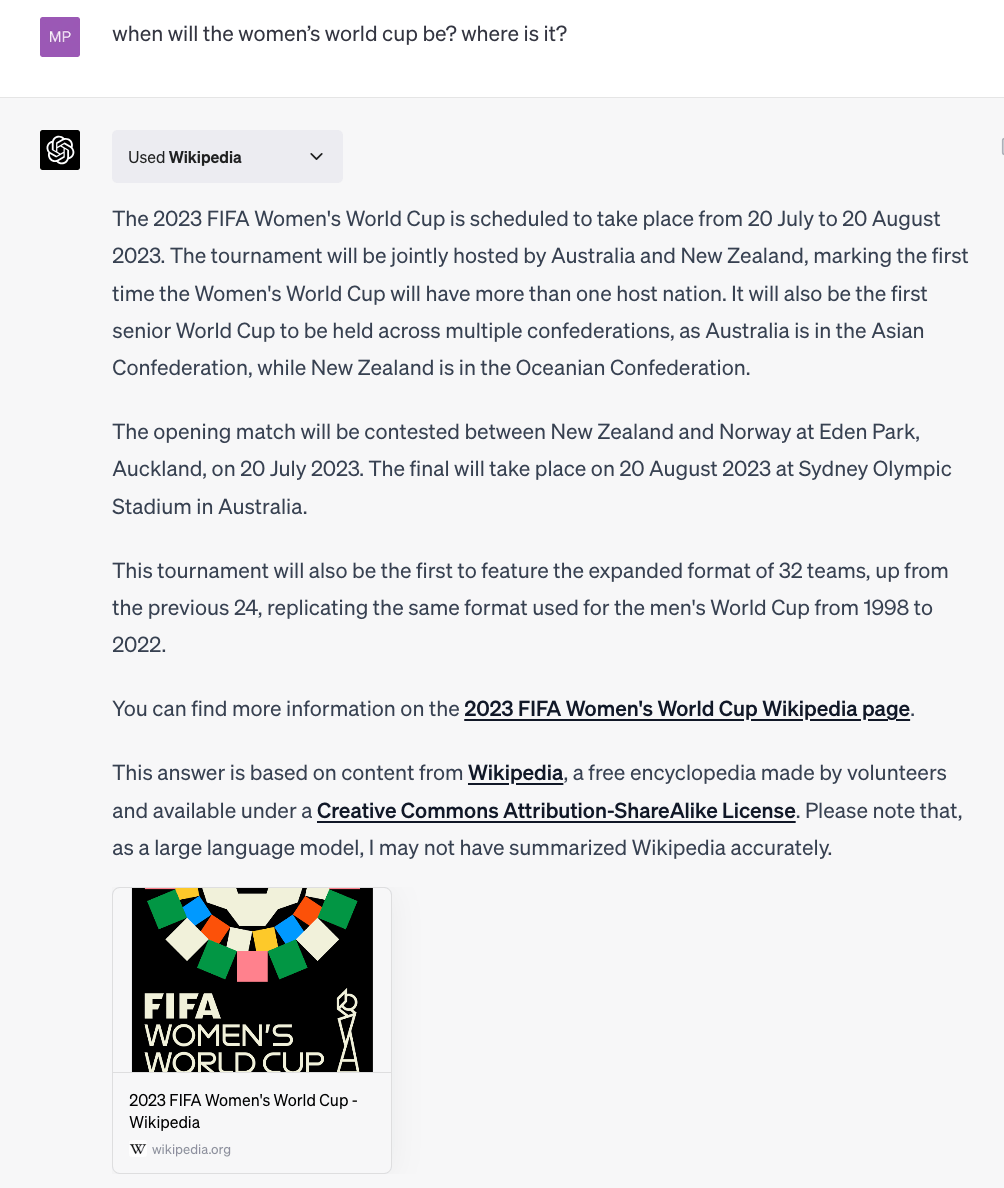
In July of last year, we announced “Future Audiences,” a new initiative of the Wikimedia Foundation to explore how we can continue to meet the needs of knowledge-seekers and knowledge-sharers for generations to come. This post is a midyear update on what we’ve learned through experimentation to date and where we’re headed next.
How will future generations learn from and contribute to Wikipedia? We don’t yet know – but through quick experiments over the last year, the Wikimedia Foundation has gathered deeper insights on how Wikipedia can continue to meet the needs of knowledge-seekers and knowledge-sharers for generations to come, even as technology and user behavior online continue to evolve. Read on for what we’ve learned from our first round of experiments (exploring ChatGPT and social apps), and a new experiment in online text evaluation we are planning based on these learnings.
Reminder: What is “Future Audiences”?
The mission of the Wikimedia movement has always been to bring free knowledge to everyone in the world. However, we know that recent technological developments – such as advances in artificial intelligence, new social apps, and devices that allow us to interact with the digital world in new ways – have the potential to shape the role of Wikimedia projects within the larger information ecosystem. While our mission remains the same as when Wikipedia started over 20 years ago, the methods to accomplish it will need to continue to evolve.
To do so, last year the Wikimedia Foundation created a new track of work called “Future Audiences,” a cross-team collaboration to explore how we can reach future audiences of knowledge seekers and contributors.
Future Audiences doesn’t build products – it launches time-bound experiments to identify and recommend opportunities for the Wikimedia Foundation to innovate. lf an experiment yields promising results, it may lead to the Wikimedia Foundation making bigger investments in new products and/or approaches to engaging new audiences; if it doesn’t (as was the case with our first experiment, a Wikipedia plugin for ChatGPT – more on this below), we will still have gained valuable insights, quickly and without significant impact on our resources.
What explorations have we completed and what have we learned to date?

1. Conversational AI: More than just a chatbot
We started the year with the following research questions about developments in conversational AI:
- Will knowledge-seekers online transition to getting information from ChatGPT instead of Wikipedia?
- How well does conversational AI do at finding and summarizing information from Wikipedia?
Our first experiment for the year was building a Wikipedia plugin for ChatGPT, which allowed ChatGPT users to receive answers to general knowledge questions specifically from Wikipedia (rather than the general data that the bot was trained on). Findings from this experiment helped us learn:
- ChatGPT is not the new Wikipedia – Wikipedia remains an important and trusted source of information online. From traffic data to Wikipedia over the course of the year, as well as usage and survey data from our experimental ChatGPT plugin, we concluded that even if consumers are starting to use AI chatbots like ChatGPT for information, it seems to be in addition to, not instead of Wikipedia. Users of our plugin said they still visited Wikipedia directly and reported that when they knew the information they were getting from ChatGPT was coming from Wikipedia, they tended to trust it more.
- Conversational AI can find and summarize Wikipedia content with fairly high (though not perfect) accuracy. While people seem to be (understandably) wary of getting information from generalized chatbots like ChatGPT, the process we used to create our experimental plugin (i.e.: using AI to more intelligently find relevant information in a specific knowledge base like Wikipedia and return a summary back to the user, a technique known as retrieval-augmented generation or RAG) provided fairly high-quality, though by no means perfect, output.
This leads us to conclude that generative AI may have an important role to play in helping future audiences navigate Wikipedia knowledge more efficiently, but chatbots are not necessarily the only or best way to accomplish this. These findings also led us to a new AI experiment, Citation Needed (more on that below).
2. Personality-driven social apps: a new wiki rabbit hole?

Though 2023 was the year of ChatGPT, we identified another key trend in last year’s annual External Trends report: younger audiences’ increasing preference for information-seeking not on the web or Wikipedia, but on personality-driven social apps like TikTok and YouTube. This insight led us to the following research questions:
- Could remixing Wikipedia content into more social-app friendly formats make information more appealing to younger audiences?
- Are there content creators on these apps who care about sharing reliable information and content from Wikimedia projects?
Through qualitative research (surveys, interviews, and usability studies with social app consumers and creators), we learned the following:
- Younger audiences are more skeptical of the information they see online, and they prefer to learn from people, rather than from impersonal websites. While the format that information is presented in definitely matters in capturing their attention (i.e., they tend to prefer shorter-form, media-rich experiences to longform text, who the content is coming from is also very important. This could be an opportunity for Wikipedia to present itself more clearly to this audience as a community of people who share an interest in reliable knowledge.
- There is a community of knowledge creators who are sharing facts and images from Wikimedia projects on apps like TikTok, and reaching large audiences. These creators are motivated by sharing reliable knowledge on topics they’re passionate about, and they rely on Wikipedia as a resource for producing content. While they aren’t interested in directly contributing to our projects, we have an opportunity to explore how to engage them in helping us spread free knowledge in innovative new ways, and invite more global youth into our movement.
Where are we going next?
New experiment: “Citation Needed”
As the digital space is increasingly at risk of being overwhelmed by misinformation, we are exploring whether AI can be used to harness Wikipedia’s knowledge to help readers understand the reliability of the information they consume online.
Citation Needed is a new experiment that aims to do just this. Through an experimental extension for the Chrome web browser, which uses advanced Large Language Model (LLM) functionality, users will have the ability to quickly compare what they are reading online to Wikipedia’s content. The extension will present users with information about whether the selected claim is supported or not by information on Wikipedia, including the number of citations used on the related Wikipedia article, the number of contributors who have worked on it, and the date it was last edited. As with our first generative AI experiment, we will also be carefully tracking how well AI does at searching for and summarizing information from Wikipedia within this feature. Over the next few months, Citation Needed will be available to users who are interested in testing it, and we will be evaluating usage and user feedback.
If you’d like to learn more about and help test Citation Needed, please visit the project page on Meta-Wiki for more details.

Can you help us translate this article?
In order for this article to reach as many people as possible we would like your help. Can you translate this article to get the message out?
Start translation